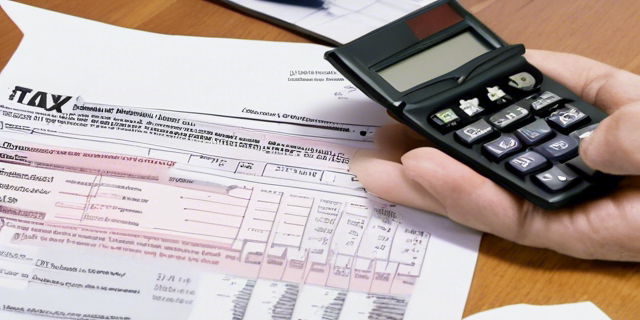Introduction
Ah, tax season. That time of year that can send shivers down the spine of even the most organized person. But it doesn’t have to be a season of stress and endless paperwork. Whether you’re a seasoned tax filer or someone who breaks out in a sweat at the thought of W-2s and 1099s, we’ve got you covered. Simplifying the process of income tax return filing is all about preparation and knowing a few expert tips and tricks. And let’s face it, who doesn’t want to maximize their refund and minimize the hassle?
So, before you start groaning at the thought of sorting through receipts and tax documents, take a breath. We’re here to make this tax season the smoothest one yet with our Top 5 Tips for Smooth Income Tax Return Filing. Keep reading to turn this potentially daunting task into a breeze.
Understanding the Importance of Tax Season Preparation

Tax season can often seem like a daunting time of year, with a mix of dread and procrastination for many. However, approaching this period with the right mindset and preparation can transform it into a smooth and even rewarding experience. A sound understanding of the significance of tax season preparation is the first crucial step toward navigating this period effectively.
First and foremost, adequate preparation allows you to streamline the entire process, eliminating last-minute rushes that can lead to errors or missed opportunities for tax savings. It’s not just about getting your tax return filed on time; it’s about ensuring that you’re doing so in the most advantageous way possible. Engaging in tax season preparation can unearth deductions and credits you might not have been aware of, maximizing your refund or minimizing what you owe.
Furthermore, being organized and ready for tax season can protect you against the stress and potential financial penalties associated with filing late or inaccurately. It’s also about peace of mind. Knowing that you have all your documents in order and have considered all your tax-saving opportunities can relieve a significant burden, allowing you to focus on other important aspects of your life.
Proper preparation also means you’re less likely to be audited by the IRS. When returns are accurately filed, with all information clearly documented and accounted for, the chances of discrepancies that could trigger an audit are significantly reduced. Additionally, if you’re ever subject to an audit, having well-organized records will make the process far less challenging.
In essence, understanding and embracing the importance of tax season preparation sets you on a path to not only meet your obligations but to do so in a way that benefits your financial health. Now, let’s explore how to put this preparation into effect with some practical tips.
Top 5 Tips for Smooth Income Tax Return Filing

Approaching tax season with a plan can significantly simplify the process. Here are top five tips designed to guide you through efficient income tax return filing, ensuring you maximize your return with minimal stress.
Start Early and Stay Organized
One of the simplest yet most effective strategies for a smooth tax season is to start early and maintain organization. Begin by gathering all necessary documents as soon as they’re available. This includes W-2 forms from employers, 1099 forms if you’re self-employed or have received other income, mortgage interest statements, and records of any deductions or credits you plan to claim, such as charitable donations or education expenses.
Create a dedicated space, whether it’s a physical folder or a digital space, to keep all your tax-related documents. This will save you a significant amount of time and frustration when you begin to fill out your tax return. Additionally, maintaining a year-round filing system for receipts and documents can reduce the workload when tax season rolls around.
Starting the process early gives you the luxury of time. It allows you to carefully review your documents, seek clarifications on confusing aspects, and ensure you’re not making rushed decisions. This approach not only contributes to a smoother filing process but can also help you identify more opportunities for tax savings.
Maximize Your Deductions and Credits
Understanding the deductions and credits available to you can dramatically impact your tax return. Deductions reduce the amount of your income that’s subject to taxes, while credits reduce your tax bill directly. Familiarize yourself with both standard and itemized deductions to determine which route will yield the greatest benefit.
For instance, if you’ve made significant charitable donations, have high medical expenses, or have paid substantial mortgage interest, itemizing your deductions might be more advantageous than taking the standard deduction. However, this varies widely based on individual circumstances, so it’s essential to assess your situation carefully.
Don’t overlook credits such as the earned income tax credit (EITC), education credits, or credits for energy-efficient home improvements. These can provide substantial savings but often come with specific eligibility requirements. Researching these options or consulting with a tax professional can uncover credits and deductions you might have missed.
Utilize Tax Software or Professional Help
For many, the complexity of tax laws makes the idea of filing taxes daunting. However, utilizing tax software or hiring a professional can simplify the process enormously. Tax software programs are designed to walk you through the filing process step by step, asking relevant questions to ensure you’re covering all bases. They automatically calculate your taxes based on current laws and can highlight potential deductions or credits you may have missed.
If your financial situation is more complex, seeking professional help might be the best route. Tax professionals keep up-to-date with the latest tax laws and can offer personalized advice tailored to your specific circumstances. While this route involves a cost, it can often pay for itself by maximizing your return or saving you from potential penalties associated with filing errors.
Double-Check Your Information for Accuracy
One of the most common reasons for delayed returns or audits is inaccuracies in the tax return. Before submitting your return, take the time to double-check all entries for accuracy. Verify personal information, such as your Social Security number and address, and ensure all income and deduction amounts match the supporting documents.
Mistakes, as simple as transposing numbers, can lead to processing delays or incorrect tax calculations. Furthermore, inaccuracies can inadvertently flag your return for an audit, causing unnecessary stress and potential penalties. Taking a few extra moments to review your return can save considerable time and trouble later.
File Electronically for Faster Processing
The IRS encourages electronic filing for several reasons. Not only is it more secure than paper filing, but it also speeds up the processing time, allowing you to receive your refund more quickly. Electronic returns are typically processed within three weeks, whereas paper returns can take six to eight weeks or longer.
Filing electronically also reduces the likelihood of errors since the software checks for common mistakes and ensures all necessary sections are completed before submission. If you’re due a refund, opting for direct deposit further accelerates the refund process, getting the money into your account without the additional wait for a check to arrive in the mail.
In summary, tax season doesn’t have to be a time of stress and frustration. By understanding the importance of preparation and employing these top tips, you can navigate tax season with confidence. Start early, stay organized, take full advantage of deductions and credits, seek professional help if needed, ensure the accuracy of your information, and file electronically for the smoothest possible experience. With these strategies, you can not only simplify the process but potentially improve your financial health through a maximized tax return.
Conclusion
Tax season doesn’t have to be the headache many of us dread. By employing the tips outlined above, you can navigate this period with greater ease and confidence. Remember, the key to smoothing out the taxing process lies in early preparation, staying organized, seeking help when needed, making the most of deductions and credits, and filing electronically.
Implementing these strategies can not only speed up your filing process but also potentially increase your refund. So, as you approach this tax season, take a deep breath, gather your documents early, and approach tax filing with a plan. With the right knowledge and preparation, you can transform tax season from a time of stress to a period of financial success. Here’s to a smoother tax season ahead!

















